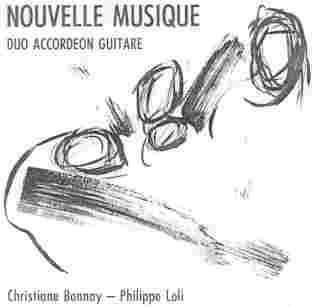
Program:
Nouvelle Musique
Program:
Tomas Gubitsch: Villa Luro (accordion & guitar duet)
Wladislav Zolotarev: Matin d'Hiver (accordion solo)
Frederic L'Epee: Duo
Rafet Rudi: Suite pour guitare
Jan Truhlar: Kontroverse (duet)
Wladislav Zolotarev: Rhapsodie Espagnole (accordion solo)
Stepan Rak: Finnish Story (guitar solo)
Patrick Busseuil: Mobile 86 (duet)
Total Time: 64:58
Released in 1991
label: Philippe Loli (AG 270691)
33, av. du Carnier
06240 Beausoleil
France
tel: 93.78.32.40
Review by Henry Doktorski:
What a delightful surprise: a CD of contemporary classical works for accordion and guitar! The sounds of the two instruments are obviously contrasting (reeds and strings), yet wonderfully balanced. I was amazed at the amount of (what I consider) excellent music written for this novel duo. I enjoyed every piece on this album, from the opening of the tango-influenced Villa Luro (percussive finger tapping on the body and strings of the guitar with staccato chords on the accordion) to the driving rhythms of the final piece: Mobile 86 (apparently a reference to its year of composition.)The Argentinean composer, arranger and guitarist Tomas Gubitsch (b. 1957) has performed with the renowned Astor Piazzolla Ensemble and has written works including the opera "Shoot Again" and a concerto for trio and orchestra. Villa Luro reflects the diversity of his tango and classical background. I found his exploitation of the rich accordion left-hand manual to play various melodic material very satisfying, especially in the beautiful and romantic middle section.
Wladislav Zolotarev (1942-1975) is perhaps the greatest Soviet composer (next to Sofia Gubaidulina) who has written extensively for the bayan (Russian button accordion). Although Zolotarev wrote vocal music, string quartets, compositions for chamber and symphony orchestras and an oratorio (Monument to the Revolution), his works for bayan are considered to be his greatest musical achievements.
Lips and Surkov wrote in Anthology of Compositions for Button Accordion, "The creative work of Vl. Zolotarev can be described as a milestone of the utmost importance for the incontestable progress of accordion music. . . . In his Partita (1968), Six Children's Suites (1969/74), his Sonata No. 2 (1971) and Sonata No. 3 (1972), and Five Compositions (1971), the advantages of the new-type [converter free-bass] accordion have, as never before, been wholly revealed. The instrument has become a full and equal participant in the chamber sphere of art music."
Matin d'Hiver is a gentle, introspective organ-like meditation while Rhapsodie Espagnole is a thirteen minute showpiece of accordion virtuosity. The dissonant minor seconds in the lower range of the left-hand manual from the introduction create a mysterious suspense-full atmosphere which is finally dispersed at the entrance of the theme in a Spanish style.
Duo by the French composer Frederic L'Epee (b. 1955)) is a masterpiece (in my opinion) of ostinato rhythms and dissonant melodies. He studied harmony, fugue, counterpoint and composition at the Conservatoire de Nice and performed in a progressive rock band in the mid-1970s. He has written numerous pieces for guitar, three symphonic poems and a quartet for classical guitars. One of his works for electric guitar and twelve other instruments won first prize in composition in 1988. Duo was written for Christiane Bonnay and Philippe Loli in 1990.
Suite for Guitar by the Yugoslavian composer Rafet Rudi (b. 1949) won a prize from the Society of Yugoslavian Composers in 1985. The movements are: vivace energico, largo, allegretto and lento.
Kontroverse by the Czechoslovakian composer Jan Truhlar (b. 1928 in Prague) is a fascinating comparison between repetitive rhythmic figures and apparently a-rhythmic sound clusters. The piece exploits the high and low ranges of both instruments in a remarkable display of contrasts. Truhlar studied guitar at the Conservatory of Prague and composition with Frantisek Picha and Pavel Borkovec. In 1962 and 1964 he won the first and second prizes in composition for Radio France at Paris with his quartet for flute, violin, cello and guitar, and his concerto for guitar and orchestra.
Finnish Story by the Czechoslovakian composer Stepan Rak (b. 1945 in Prague) is a dramatic seven minute work composed for Philippe Loli and first performed at the Theatre Kolaraz in Belgrade. Rak studied guitar at the Conservatory of Prague and studied composition with Jiri Dvoracek.
While listening to the final piece on the album, Mobile 86 by Patrick Busseuil (b. 1956), I had a realization: this was not really a duet, but a trio for three instruments of distinctively different timbres: guitar, accordion right hand and accordion left hand.
Of course, I intellectually understood this all along: that the free-bass accordion is a two-manual instrument with two very different tonal qualities. (Depending on the ranks of reeds sounding, the left-hand manual usually has a more mellow tone quality compared to the same pitches in the right hand.) However, the actual experience of this left-brain knowledge was enlightening!
After hearing this piece, I was inspired to play the entire album again and listen more carefully for the "trios!"
The engineering is excellent on most of the album, although Suite for Guitar and Finish Story (the two guitar solos which were recorded live in concert) are marred by an unusually distracting amount of tape hiss.
Concert accordionist Christiane Bonnay (born in Dakar Senegal in 1959) studied bayan with the Russian artist Friedrich Lips and has taught at l'Academie de Musique Prince Rainier III de Monaco since 1981. Guitarist Philippe Loli (born in Monaco in 1961) studied at the Academie of Music with Pier Domenico Amerio, the disciple of master Andres Segovia. The CD booklet notes are in French.
| About The Free-Reed Review |
| Invitation to Contributors / Submission Guidelines |
| Back to The Free-Reed Review Contents
Page |
| Back
to The Classical Free-Reed, Inc. Home Page |